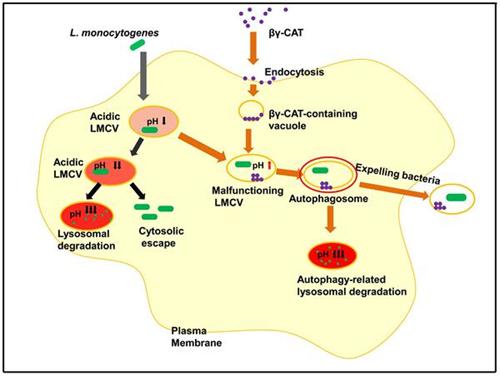Intracellular pathogens, including bacteria, viruses and fungi, can exploit various strategies to adapt or modify the cellular environment to escape from host immune defense. Many intracellular pathogens exploit cellular endocytic organelles to invade the host cell and have adapted to the intracellular drop in pH along the endocytic pathway to establish their niches and/or to activate penetration. Exogenous chemicals, such as NH4Cl and Chloroquine, can modify the acidic environment of endosomal compartments to inhibit productive infection of some viruses and intracellular parasites. However, whether the host cell has the corresponding defense strategy, the identification of the endogenous effector molecule machine and the regulatory network or not are important scientific issues have been explored but not always succeeded.
The research team of Prof. Yun Zhang, Kunming Institute of Zoology, CAS, previously identified and isolated a novel pore-forming protein and trefoil factor complex betagamma-CAT (patent no. ZL200810058028.5), and found that this endogenous protein machine can induce cell vacuole forming and form membrane channel on the endocytic/lysosomal pathway((Proc Natl Acad Sci USA2014,111,6702, cover story). Recently, the team members Sheng-An Li and Long Liu reveal this protein complex can modulate the acidification of cellular endocytic organelles. In host immune defense, using aListeria monocytogenesmodel, the team members found that this protein machine can impair the escape ofL. monocytogenesinto the cytosol and promote the non-lytic expulsion of intracellularL. monocytogenesto counteractL. monocytogenesfatal infection. The article “Host pore-forming protein complex neutralizes the acidification of endocytic organelles to counteract intracellular pathogens” has been published online inThe Journal of Infectious Diseases.Associate research fellow Sheng-An Li and doctoral candidate Long Liu are contributed equally to this work, and the corresponding author of this article is Prof. Yun Zhang.
This study not only reveals a novel host strategy and effector molecule to defense and eliminate intracellular pathogens in vertebrates, but also provides novel ideas and clues for in-depth studying the basic cellular biology questions of cell vacuole forming, the regulatory network and related pathophysiological mechanisms. Moreover, our study is also important for developing novel therapeutics for related diseases.
This work was supported by Natural Science Foundation of China (NSFC)-Yunnan joint Grant and the "YunLing Scholar" Grant.
The article links:
https://academic.oup.com/jid/article-lookup/doi/10.1093/infdis/jix183

Figure:Host pore-forming protein complex neutralizes the acidification of endocytic organelles to counteract intracellular pathogens
(By Sheng-an Li; Editor: Linxi HE)
Contact:
Yun ZHANG
zhangy@mail.kiz.ac.cn

